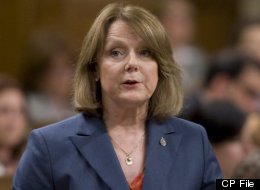 OTTAWA - NDP leadership hopeful Peggy Nash says Canada is no longer a "normal" country under Prime Minister Stephen Harper's direction.
OTTAWA - NDP leadership hopeful Peggy Nash says Canada is no longer a "normal" country under Prime Minister Stephen Harper's direction.The Toronto MP describes Harper's Canada as a country of growing inequality, record personal debt, hopelessness among youth and a federal government that continually tells people to expect less.
"I don't think that's normal," Nash told The Canadian Press in a wide-ranging interview Thursday.
"I think that's wrong."
Nash said Canadians have a right to expect economic, social and environmental progress, where people co-operate with each other and the government doesn't pit one group against another.
"I think we can have that kind of normal country and I'm determined that I'm going to lead that."
Nash, one of nine contenders seeking to succeed Jack Layton, who died of cancer in August, declined to peg herself as being on the left, centre or right of her party. But the onetime senior negotiator for the Canadian Auto Workers appeared pleased with a Toronto Star columnist's description of her as a "practical radical."
The NDP's finance critic until jumping into the leadership race late last month, Nash offered detailed criticism of the Harper government's economic policies, including its opposition to a tax on financial transactions as a way to deter speculators, what she called "a shadow banking system."
"To me, it makes good sense to take a look at that ... Something that helps reduce speculation, stabilize the global economy is a positive thing."
Nash said speculators are making the sovereign debt crisis in Europe worse because they're essentially "betting that these governments are going to default" on their debts, thereby adding to the destabilization. And she argued that a small tax on "the very risky, dangerous, speculative activities" wouldn't be as onerous as Harper's Conservatives have made out.
The Tories have also maintained that a financial transaction tax would penalize Canadian banks, even though they were not part of the problem that led to the global economic meltdown in 2008. But Nash said the idea is to rein in global speculation, the repercussions of which are felt in Canada, whether or not our banks are to blame.
"We are not immune from the impact of the global economy," she pointed out. "If this reduced the likelihood of damaging speculation in Europe and helped produce greater stability, we would all benefit."
While the notion of a financial transaction tax has picked up some steam recently, with France and Germany pitching the idea for Europe, Nash noted that the key players in the global economy, notably the United States and United Kingdom, remain opposed. Nash said the tax needs to be globally applied to work.
Nash also said she thinks it's worth debating whether the Bank of Canada's monetary policy should continue to be aimed at keeping inflation at two per cent or less. She said the bank's mandate to keep inflation under strict control was adopted as a result of soaring interest rates in the early 1980s but, with economic conditions dramatically different now, she suggested it may be more appropriate to focus on employment levels or inequality.
"Like any policy, I think it's something we have to continually review, monitor and see if it continues to meet our needs."
Nash steered clear of two ideas floated by Brian Topp, the perceived frontrunner in the leadership contest. He has proposed hiking income taxes on the rich and has said he'd be willing to consider hiking the federal sales tax once the economy is on sounder footing.
Nash ruled out hiking the harmonized sales tax. As for taxing the rich more, Nash said only that she favours a "fair and progressive tax system," declining to comment specifically on "one-off" ideas.
Origin
Source: Huff
No comments:
Post a Comment